(VOVWORLD) - Bhutan is a country unlike any other, a land where monks still meditate for years in the sacred caves to the East. A country ruled by a monarch who freely gave up his absolute power to usher in democracy. A place where progress is officially measured by happiness, rather than Gross National Product, using the government’s pioneering Gross National Happiness system. The first carbon-negative country in the world, Bhutan has preserved its mountains, forests and people on its journey to modernise, a feat that is totally unique in the history of this world. Needrup Zangpo, Executive Director of the Bhutan Media Foundation shares more interesting Bhutan’s facts.
Ngoc Diep: Welcome back to our show, Needrup. We loved your story about Bhutan’s unique culture and gross national happiness index in our previous show. We’d love to know more about your beautiful Bhutan, which is known as a Buddhist country with strong beliefs, is that true?
Needrup Zangpo: Buddhism is very much alive in Bhutan and the country is considered the last stronghold of Vajrayana Buddhism. Buddhism here is more of a way of life than a religion. Fluttering prayer flags, people circumambulating temples, red robed monks performing rituals are all that shows how Buddhism is an integral part of Bhutanese life. The entire country is punctuated with dzongs (fortresses), monasteries, stupas, and prayer wheels — all symbols of our faith. The Bhutanese also have a strong reverence to nature and spiritual world because of our Buddhism beliefs — mountain peaks are considered to house Guardian deities, lakes inhabited by lake deities and cliffs resided by cliff deities. In fact, mountains are so sacred to the Bhutanese that the government has banned mountaineering on any peak above 6000m.
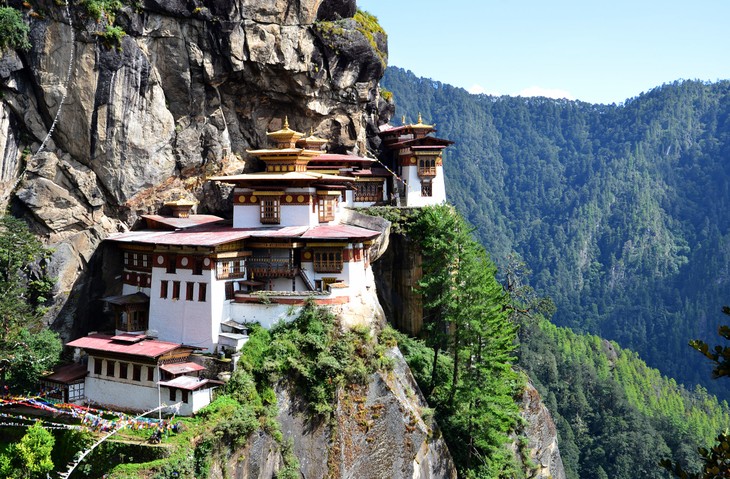 Taktsang Tiger’s Nest Monastery. Photo: https://www.littlebhutan.com/ Taktsang Tiger’s Nest Monastery. Photo: https://www.littlebhutan.com/ |
Ngoc Diep: I know that Bhutan is also famous for its colourful, vibrant festivals. Tell us more about that, please.
Needrup Zangpo: Bhutan is rich in cultural diversity and this richness is further enhanced by the wide variety of elaborate and colourful religious festivals that are celebrated throughout the country. Every village is known for their unique festival though the most widely known is the annual Tshechu, an annual religious festival.
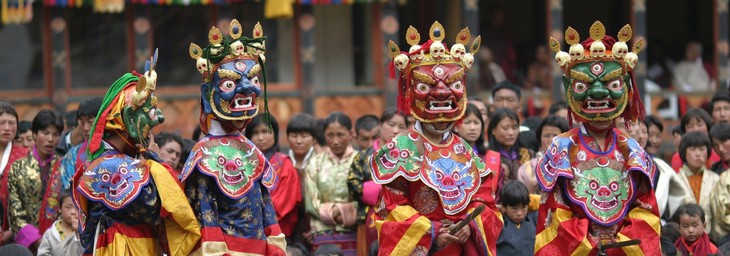 Tshechu is a religious festival meaning "tenth day" held annually in various temples, monasteries and dzongs throughout the country. It is where entire communities come together to witness religious mask dances, receive blessings and socialize. Photo: https://www.bhutan.travel/ Tshechu is a religious festival meaning "tenth day" held annually in various temples, monasteries and dzongs throughout the country. It is where entire communities come together to witness religious mask dances, receive blessings and socialize. Photo: https://www.bhutan.travel/ |
Ngoc Diep: What’s so special about the annual Tschechu festival?
Needrup Zangpo: As the Tshechu begins, the villagers and the general populace dress in their finest clothes and congregate at their local temples and monasteries, where these festivals take place. Tshechus are usually occasions to mark important events in the life of the second Buddha, the Indian/Pakistani Tantric master known as Guru Rinpoche or the Precious Master. Various mask dances are performed together with songs and dances for three days on average. These religious celebrations are lively, high-spirited affairs during which people share meals of red rice, spicy pork, Ema Datshi and Momos (pork/beef dumplings) whilst drinking the heady traditional rice wine known as Ara. These occasions provide the villagers with a respite from the hard labour of their day-to-day lives and give the community an opportunity to catch up with family and friends.
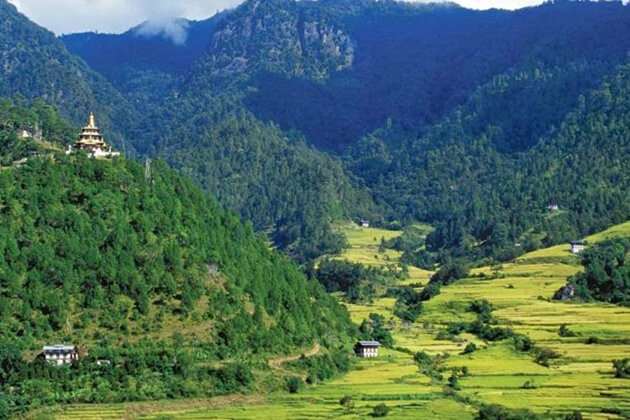 Covered with forests, Bhutan absorbs more CO2 than it emits. Photo: https://www.businessbhutan.bt/ Covered with forests, Bhutan absorbs more CO2 than it emits. Photo: https://www.businessbhutan.bt/ |
|
Ngoc Diep: That sounds really fun. In 2019, Bhutan was presented the Green Destinations Gold Award by ITB Berlin, the world's largest tourism trade fair. Bhutan is well known as one of the world’s leading countries in environmental conservation. Can you tell us more about this?
Needrup Zangpo: Sure. Another one of the most interesting Bhutan facts: it is the only country in the world that is carbon-negative, which means it takes more greenhouse gasses from the atmosphere than it emits. According to our figures, our nation of around 750,000 people removes nearly three times as much Carbon Dioxide as it produces. Bhutan’s ability to be a net carbon sink is partly down to its natural forests. Over 72% of the country is covered in forests. The mountainous country is topped with high altitude mountains and carved with gorgeous canyons and valleys.
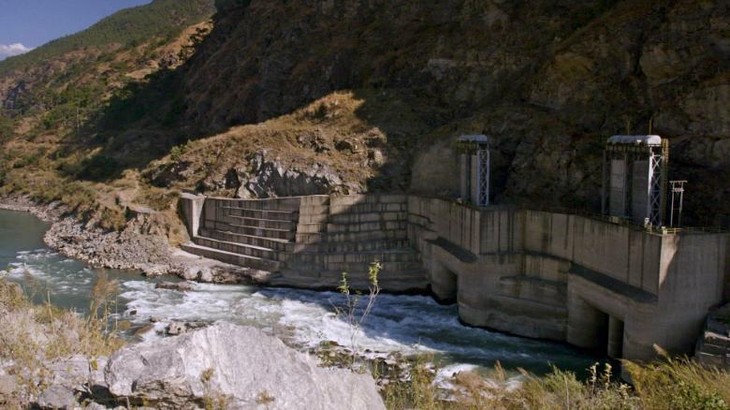 Bhutan generates hydropower from its mountain streams. Photo: cnn.com Bhutan generates hydropower from its mountain streams. Photo: cnn.com |
Ngoc Diep: I think one of the facts contributing to this is that Bhutan has banned plastic bags since 1999, am I right?
Needrup Zangpo: Yes, you’re right. While many countries are now adopting the no-plastic policy, Bhutan has banned plastic bags since 1999. The country has always had a tradition of protecting its environment, flora and fauna.
Ngoc Diep: What a wonderful green life you’re enjoying there: carbon negative, no plastic bags, and no smoking, as well?
Needrup Zangpo: Smoking is permitted but not in public places. Bhutan has banned smoking since the 1990s. Bhutan is the only country in the world that completely bans the sale and production of tobacco and tobacco products. Under the law, anybody found selling tobacco can face imprisonment for a period of three to five years. In the 1990s, many of the 20 districts of Bhutan began declaring themselves smoke-free zones. By 2004, the government banned the sale of tobacco as well as smoking in public places.
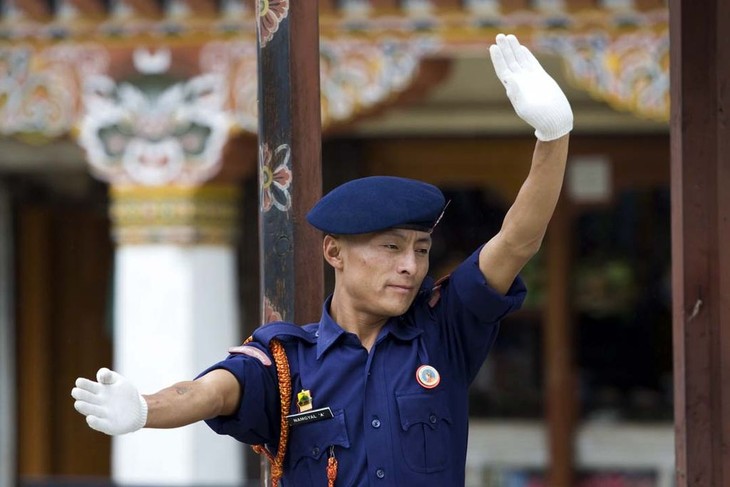 Traffic police in Thimphu. There are no stop lights or traffic signals in all of Bhutan. Photo: wikipedia.org Traffic police in Thimphu. There are no stop lights or traffic signals in all of Bhutan. Photo: wikipedia.org |
Ngoc Diep: A unique country, I have to say. I also read somewhere that there are no traffic lights in Bhutan. This is amazing. How can you manage the traffic without traffic lights?
Needrup Zangpo: Well, that’s another amusing Bhutan fact! Bhutan’s capital city, Thimphu, is the only capital in the world without traffic lights. In fact when traffic lights were installed, there was such public outcry that the city went back to using white-gloved traffic policemen. Other than that, the entire country has no traffic lights. It works because there are not many cars around in Bhutan, considering how mountainous and isolated it is. The Bhutanese are also very calm and laidback, even when it comes to driving in an orderly fashion.
Ngoc Diep: That’s very interesting. Thank you so much for sharing such amazing facts about your beautiful country. I really hope to visit Bhutan one day.
Needrup Zangpo: Thank you, too. My pleasure to be on the show today and you’re always welcome to Bhutan.